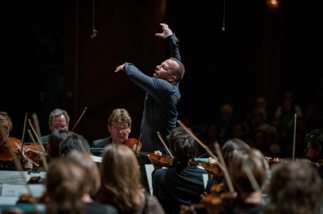|
Back
The Power And The Glory New York
Isaac Stern Auditorium, Carnegie Hall
06/16/2022 -
Hector Berlioz: Overture “Le Corsaire”, Opus 21 – Les Troyens: “Chers Tyriens”, “Chasse royale et orage” & “Adieu, fière cité” – Symphonie fantastique, Opus 14
Joyce DiDonato (Mezzo-Soprano)
The MET Orchestra, Yannick Nézet-Séguin (Music Director and Conductor)

Y. Nézet-Séguin (© Marco Borrelli)
“His orchestration is so filthy that I have to wash my hands after turning over a few pages.”
Felix Mendelssohn to Robert Schumann
“He is an immense nightingale, a lark as great as an eagle...the music causes me to dream of fabulous empires filled with fabulous sin.”
Heinrich Heine
What a shame for humanity that Hector Berlioz was too early for Dostoyevsky and too late for Coleridge. Their partnerships encompassing dreams and hells, hashish and guilt, mystics and miracles would have turned that mundane word “Romantic” into a footnote for something equally luminous and numinous.
But since they probably didn’t know each other, one must be satisfied with a whole evening of Hector Berlioz himself. The composer had turned his own feverish manic personality (and artistic genius) into Byron, into a hashish-soaked traveller, a Trojan warrior and a Shakespearean acolyte. And last night, we heard three quite startling incarnations, let by the startling French-Canadian conductor Yannick Nézet‑Séguin.
If there were no sound in Carnegie Hall, one could have divined that this was a Berlioz conductor. His movements for the Symphonie fantastique were more fantastic than symphonic, electrifying, jumping, cueing in each consort, a ballet of hands, throwing over-heavy visual beats. (One shouldn’t mention this in a serious review but the cerise‑red soles of his shoes radiated through the hall). More seriously, the MET orchestra, led by their Musical Director did the best work since James Levine commanded them.
From the opening Corsair to the “hashish bad-trip” Dies Irae, they showed a clean unanimity of the strings, an exactitude of consorts, and of course all the timpani one could have wished for.
The results would have displeased more buttoned-down audience members. Some who heard the New York Philharmonic this week might have felt the MET Orchestra lacked the gravitas given Mahler and Barber.
But this was a night for the composer who could hardly play the violin, whose only string instrument was the guitar, and who didn’t give a damn for gravitas or hesitation.
It goes without saying that Mr. Nézet‑Séguin gave us incandescent music. But twice in this performance, he actually transubstantiated the notes to something different.
Yes, the early Corsair overture was played excitement (the opening), vigor (the body) and orchestral grandeur. And noticeable here was that the main theme in its original form was little more than plebeian French comic-opera aria. Mr. Nézet‑Séguin gave it more than verve: he gave it an alchemical aureole.
The second half was devoted to Symphonie fantastique. Now no conductor can possibly get the last two movements wrong. They are foolproof crowd-pleasers. (And if Bach wrote his music for the glory of God, Berlioz wrote his music for the elation of audiences.)
Getting the first three movements is difficult for anybody.
As for the “Ball” and the “Country Scene”, Mr. Nézet‑Séguin was okay. The former was a bit sludgy at times, the second showed his woodwind players at their best.
Yet it was the opening movement which was an eye–or ear-opener–for this listener. I had always consciously tried to find the structure, the cohesiveness, of “Daydreams - Passions”. Mr. Nézet‑Séguin showed me my errors. By emphasizing every softness, banging out the sudden blasts, by allowing all his instruments to play at their extremes, he gave us not an opening movement, but the real zigzag, unfathomable singular language of dreams themselves. The Berlioz genius here was to eradicate reason and to offer music floating on the cusp of disorder.

J. DiDonato (© Simon Pauly)
Even more than the finale of Fantastique, Joyce DiDonato brought the audience to its feet. She has that paradoxical virtue of having a light enough mezzo for any French melody. Yet her voice could be harsh, grating, with the most dramatic ferocity.
Her two solos from The Trojans spun out hypnotic lyricisms, with spoken, savage dramatic lines in both her numbers. One didn’t need the printed text to realize that Berlioz had written this grand grand grand opera like his beloved Shakespeare, where the sounds gave as much joy as the words themselves.
After the Symphonie fantastique, one wished to leave immediately. No encores, please. We’re satisfied. But Ms. DiDonato appeared again, this time encoring with a work almost vying with Berlioz’ romanticism. Richard Strauss’ Morgen displayed not only the singer’s sensitivity but the sensitivity of Mr. Nézet‑Séguin’s orchestra itself.
Harry Rolnick
|